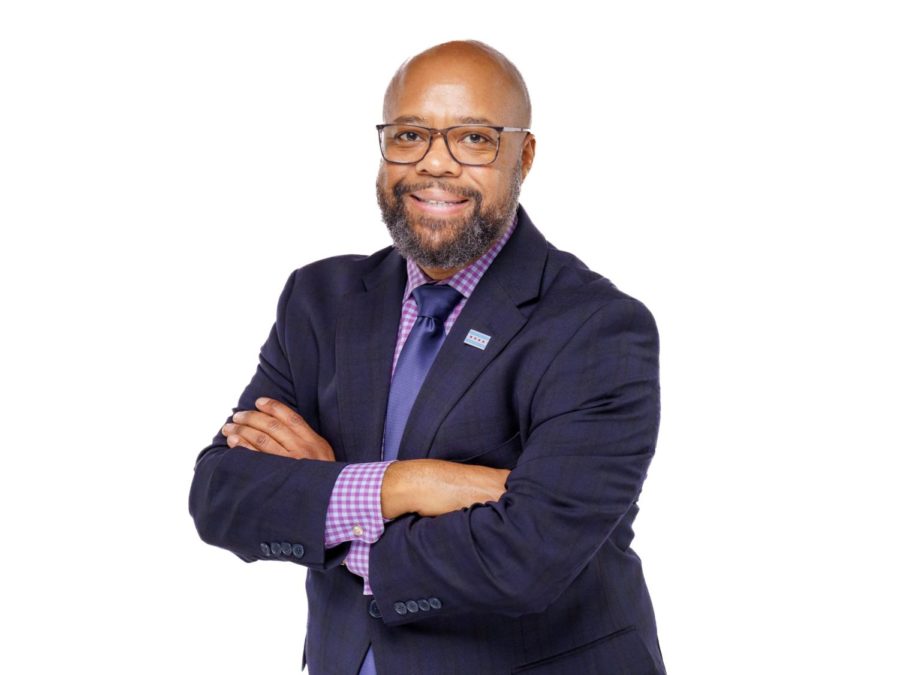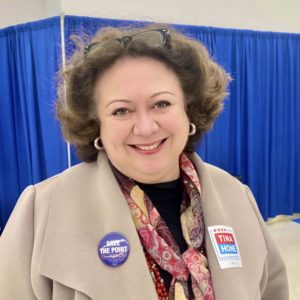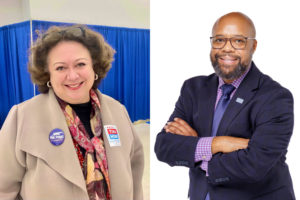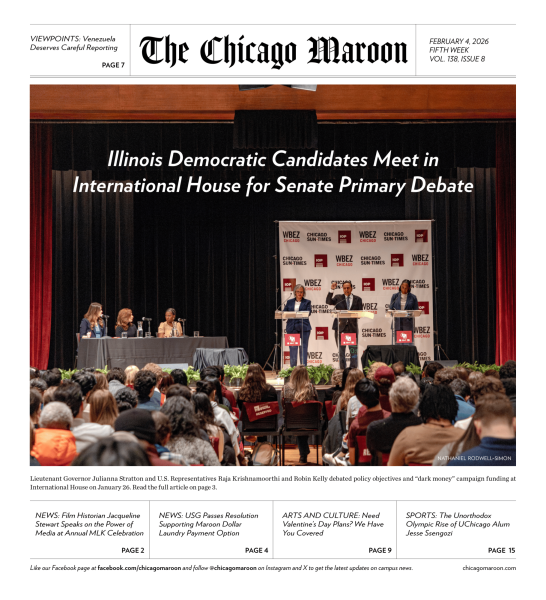Yancy Touts “Better Understanding of the Issues” Facing Fifth Ward
Fifth Ward aldermanic candidate Desmon Yancy emphasized including the community in policymaking as central to his campaign.
April 4, 2023
Community and labor organizer Desmon Yancy is running to represent Chicago’s Fifth Ward in City Council in a runoff election to be held on April 4.
Yancy faces off against Martina “Tina” Hone in the runoff after he received 25.96 percent of the vote in the initial February 28 election, the most of any candidate. They are vying to replace outgoing alderman Leslie Hairston, who is retiring at the end of her term after 24 years in office. Hairston endorsed Yancy prior to the first round.
Yancy grew up in Calumet Heights, located south of the present Fifth Ward, and attended high school at Kenwood Academy, just north of the ward. On his way to school, Yancy passed through the different neighborhoods of the Fifth Ward, broadening his perspective.
“It took me straight down Jeffery [Boulevard] through South Shore, over to Woodlawn, and then through Hyde Park,” Yancy told The Maroon. “It was those experiences that helped shape the way that I view the state of politics today and my role in helping shepherd us through this moment that we’re in.”
Yancy spent more than a decade working at a number of Chicago-based advocacy groups and unions, including six years at SEIU Healthcare Illinois/Indiana as the lead organizer and director of leadership development.
Under former Illinois governor Bruce Rauner’s administration during the mid-2010s, social service agencies were under threat.
“He had a budget stronghold on the state, and social service agencies in neighborhoods were disappearing because they just didn’t have the funding to be able to provide those resources,” Yancy said. While protesting the situation, he was arrested.
Then in 2016, following the murder of Laquan McDonald by a Chicago police officer, Yancy had a “moment of reckoning.” Yancy, the son of a Chicago Police Department (CPD) officer who served for 40 years, co-founded the Grassroots Alliance for Police Accountability (GAPA) to push for the creation of a civilian oversight body for the CPD. The group successfully advocated for the passage of an ordinance in 2021 that established the Community Commission for Public Safety and Accountability, which oversees the new police district councils that featured on the February 28 ballot.
Yancy said his time working on the establishment of a police oversight board taught him about building community-based coalitions to enact policy goals and helped him build relationships that would be useful as an alderman.
“I’ve come to realize as we look at the moment we’re in this city and the type of change that we’re all seeking to create, it’s just going to be incumbent that we have elected leaders who have done the work of bringing people together, the hard world of coalition building,” he said.
Yancy touts his community-centric approach and lived experience as an advantage over Hone, who spent much of her political career in Washington, D.C.
“Chicago politics is a very, very different place,” Yancy said. “Having been in Chicago for the last 40 years—born here but spent the last 40 years continuously here in Chicago—I have a better understanding of the issues that exist in our communities.”
Yancy has faced questions from opponents over whether he actually resides in the ward. An advertisement purchased by a group of his opponents prior to the February 28 election alleged that Yancy’s primary residence was in South Holland, a suburb of Chicago. Yancy told the Hyde Park Herald that he was not registered to vote in South Shore until last March. After initially denying he had voted in either location, Yancy admitted he had voted in South Holland in 2020 but called it an “honest error.”
In response to the allegations, Yancy provided the Herald with a number of documents including medical bills, insurance claims, tax documents, and personal mail to show that he lived in the ward as early as 2019.
“Throughout this campaign, I’ve managed to maintain, despite being under attack, this even-keeled persona because this is who I am,” he told The Maroon. “Under pressure, it’s still about making sure that we achieve our goal. Though I’ve felt really uncomfortable at times, I was just focused on making sure that the residents of the Fifth Ward had an opportunity to learn about me and my platform.”
On public safety, Yancy said that rising crime rates despite consistent increases in police funding prove that Chicago’s policing system is outdated and its leadership reluctant to change. He is particularly concerned about long police response times.
“I talked with a resident who called the police a few weeks ago for an issue, and it took the police over two hours to get to their home,” Yancy said.
He advocates a shift to fighting the root causes of violence, which he identified as inadequate mental health care and youth support systems. In the short term, Yancy said his focus is on ensuring police resources are allocated efficiently and equitably rather than reducing the overall police presence.
“We have to make sure that, in our communities that are feeling the burden of crime and also the burden of over-policing, that the system is more adequate and provides relief for our residents.”
Central to Yancy’s platform is his belief that the ward’s affordable housing is adequate in supply but inadequate in quality. Many residents, particularly seniors, face repair costs they cannot afford, so Yancy hopes to expand upon existing pilot programs that provide assistance for residents to pay for maintenance in their homes.
Yancy said the relationship between the University of Chicago and its surrounding communities, often described as tense, was in an “evolutionary moment.” He pointed to the appointment of University President Paul Alivisatos and the hiring of former deputy governor Christian Mitchell as vice president for civic engagement as evidence for his statement.
“The University is willing to acknowledge that it’s time for a new way to engage the community as it grows its footprint and influence in the ward, and I’m grateful for that,” Yancy said.
If elected alderman, Yancy specifically hopes to collaborate with the University on creating a business incubator to use the University’s resources to support new commercial ventures in the area.
“When you look at all the schools at the University of Chicago, there’s just no lack of talent that exists in current students and alumni that can plug into all these sorts of things that we’re looking to create to build the community,” Yancy said.
When asked if he too would stay in office for more than two decades, as Hairston did, Yancy said “absolutely not.”
“One of the most important things I want to do is create a civic education platform that encourages young people to vote,” Yancy said, “so that when I leave office, there is a pipeline of engaged young people, and not-so-young people, here in the Fifth Ward who are willing to step in and lead the ward in the direction the community wants to go at that time.”






